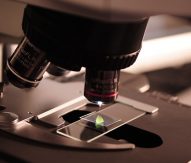
EU project takes on liver disease
Companies and academics from across Europe are coming together in a new EU project to tackle non-alcoholic fatty liver disease (NAFLD).
The €34m initiative is aimed at developing new diagnostic tests to assess patients with NAFLD and detect those most at risk of developing severe inflammation and liver scarring.
NAFLD, which is associated with obesity and Type 2 diabetes, occurs when fat builds up in the liver cells, leading to inflammation, scarring of the liver, and ultimately cirrhosis.
It affects 20-30% of the global population, but fewer than one in ten will come to harm as a result of the condition.
Identifying who will be most severely affected and progress to liver cirrhosis or cancer means that appropriate care can be provided earlier. However, this can currently only be done via liver biopsy in a specialist hospital.
‘Liver Investigation: Testing Marker Utility in Steatohepatitis’ (LITMUS) will therefore seek to develop, validate and quantify better biomarkers for testing NAFLD.
To this end, the project brings together clinicians and scientists from academic centres across Europe and companies from the European Federation of Pharmaceutical Industries and Associations (EFPIA).
It is funded by the European Innovative Medicines Initiative 2 (IMI) Joint Undertaking and co-ordinated by Newcastle University, UK, in close collaboration with pharmaceutical company Pfizer Ltd.
“Lack of easy and accurate diagnostic tests means that many patients go undiagnosed until late in the disease process,” explains Newcastle’s Professor Quentin Anstee, the co-ordinator of the LITMUS consortium. “It has also held back efforts to develop new medical treatments for NAFLD.
“Availability of better diagnostic tests will help us to target care at an early stage of disease to the people who are going to be most severely affected. It will also help us to develop more effective medical treatments for NAFLD and to run the clinical trials that the regulatory agencies need so that they can license these medicines to be prescribed by doctors.”
The 47 partner-strong consortium also includes the Integrated BioBank of Luxembourg, which will be responsible for collecting and storing the biological samples used in the study.
LITMUS will run until the end of October 2022.




